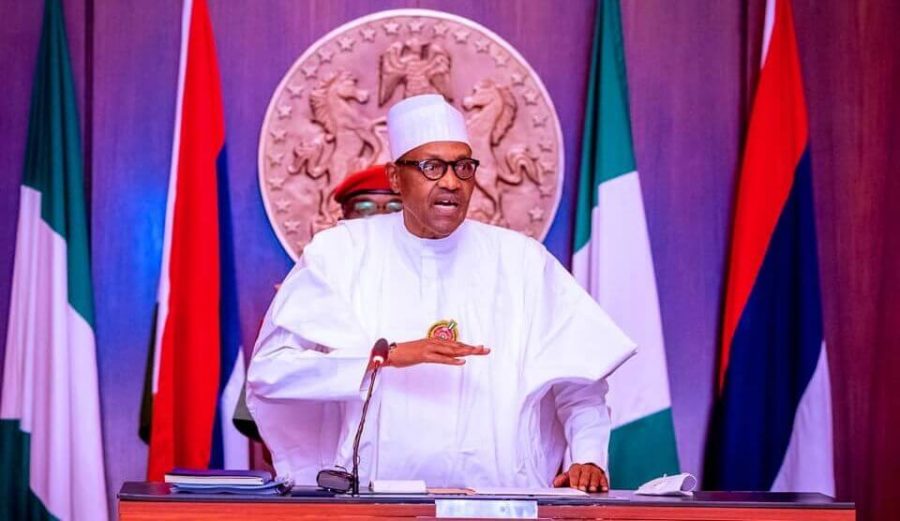Buhari Hails Investment In Fertilizer Value Chain, Says Nigeria Becoming Global PowerHouse
President Muhammadu Buhari has commended the massive investment in the fertiliser value chain stating that recent developments in the sector is moving the country to becoming a regional and global fertiliser powerhouse.
Buhari said this during a virtual meeting with members of the Presidential Fertiliser Initiative and the Fertiliser Producers and Suppliers Association of Nigeria, led by Mr Thomas Etuh.
Advertisement
The meeting was to review the progress made so far in the country’s fertiliser sector.
Buhari commended the investments that had been made by Nigerians in the fertiliser sector, noting that those investments had contributed to lifting the level of rural unemployment.
He expressed confidence in the leadership of FEPSAN under Etuh and urged investors in the industry to look beyond short-term gains, to enable them realise the immense economic and social gains available to themselves and the country.
Buhari also expressed confidence that the country would witness unprecedented prosperity with sustained investments in peace-building in the rural areas.
Advertisement
He assured of that the Federal Government would provide a favourable investment climate in the country, and thanked the King of Morocco for partnering with his administration to end fertiliser scarcity in the country.
The Federal Government and the OCP Group of Morocco had on March 2 sealed a bouquet of agreements to boost fertiliser production for Nigerians farmers.
The agreement was signed at the University Mohamed VI Polytechnic in Morocco by OCP Africa and the Nigerian delegation chaired by the Minister of Petroleum Resources, Mr. Timipre Sylva.
The business visit is a follow up to the industrial project which was officially launched in June 2018 following the success of the first phase of the Presidential Fertilizer Initiative supported by OCP.
These agreements seek to provide Nigerian farmers quality fertilizers adapted to the needs of their soil at competitive prices and produced locally.
Advertisement
The President added that the recent agreement with the government of the North African country would also go a long way in improving the balance of trade between the two countries
Buhari said, “Sustained investments by members of the association even during the recession and the COVID-19 lockdown is commendable.
“The increased investments in the rural areas are strong factors that have progressively helped in tackling some of the security issues the country has been witnessing.
“I appreciate the sacrifices and personal commitments to the economic emancipation of Nigeria, through enhanced availability of crop inputs for improved agricultural yield.
“Nigerians should be proud of the sacrifices and personal commitments you have made towards the milestones we have so far recorded.
“The recent recession didn’t affect your investments in this sector even when others were taking theirs outside the country.
Advertisement
“Investments in rural areas tackle unemployment, which is the root cause of the insecurity we have been experiencing in many parts of the country at present.”
A major highlight of the meeting was the restructuring of the PFI, to ensure it was fully private sector-led, and would provide all the funding for the procurement of raw materials necessary for fertiliser production in the country.
FEPSAN President, Thomas Etuh, had earlier highlighted the commitment and supportive roles of President Buhari in birthing the PFI which commenced the sectoral revitalization process.
He explained that the singular initiative had lifted the country from scarcity to availability of the essential agro input.
Etuh reminded the President of the initial mandate given to FEPSAN members through the PFI programme in 2016, saying that the success of the initial mandate was being leveraged to further widen opportunities.
He said, “Mr. President, when you invited us for a role in the PFI programme, there were only four blending plants in Nigeria operating at less than 40 percent capacity.
“But today, we are proud to announce the existence of 40 blending plants in the country, all operating at 100 percent capacity. Today, we are proud to announce that all the blending plants in Nigeria source 60 percent of their raw material locally.”
He informed the President that members of FEPSAN had a combined production capacity for 1.5 million metric tonnes of blended NPK fertiliser in 2021, up from one million metric tonnes in 2020.
He added that the country had also earned the enviable status of the biggest Urea producer in Africa, with the addition of Urea production from the new Dangote refinery in Lagos.
“We are at a level where the country can boast of an annual production of 6.5 million metric tonnes of Urea.
“With Dangote bringing in a fresh three million metric tonnes to add to the three million being produced by Indorama and the 500,000 metric tonnes from Notore, Mr President, you can beat your chest and say that you have delivered the country from scarcity to abundance.
“Not only in fertiliser raw materials, but also in blended NPK production.
The portfolios for fertiliser plant funding in the country that were hitherto considered unbankable are now considered bankable, thanks to the growth of the sector inspired by President Buhari,” Etuh added.
He commended the President for the passage of the Fertiliser Bill by the National Assembly and for the Anchor Borrowers Programme that had ensured finance was available for farmers through the Central Bank of Nigeria.
The FEPSAN boss noted that the collaborative efforts of the Minister of Agriculture, the Central Bank of Nigeria and the Nigerian Sovereign Investment Authority had worked in favour of the unprecedented growth recorded in the sector.
Etuh called on the President to direct the Economic and Financial Crimes Commission, and other security agencies to work with the FEPSAN taskforce on quality control to monitor fertiliser blenders.
He also said that such a move would provide surveillance against the diversion of sensitive raw materials by unscrupulous elements.



